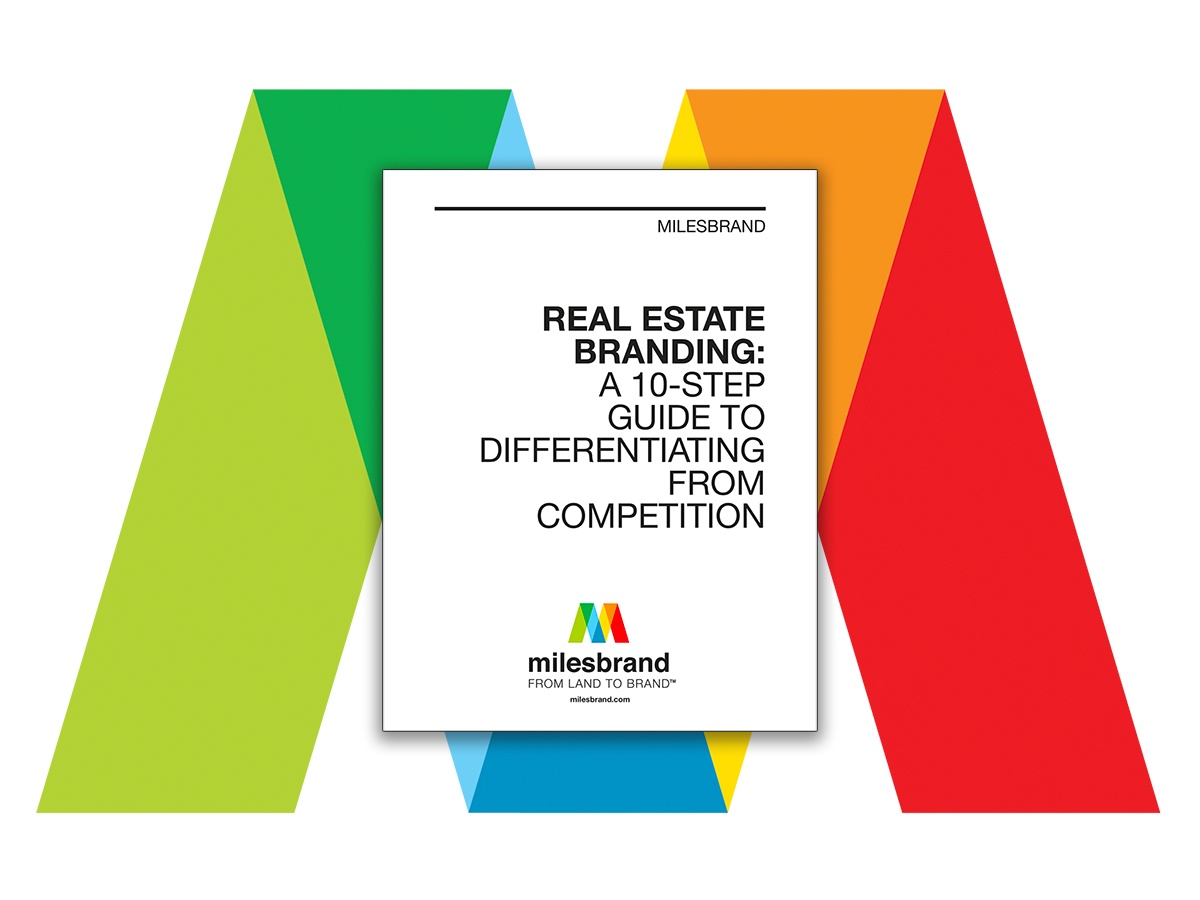December 04, 2024
What Makes Your Real Estate Brand Identity Memorable?
Homebuyers are inundated with choices, meaning your brand must differentiate itself in personal, emotional and creative ways that stand out. In today’s digital age, a well-defined brand can be the difference between a successful project and one that fades into obscurity.
Developing a powerful real estate brand identity is critical. Research shows that consistent and distinctive brands are 3-4 times more likely to achieve strong visibility. The advantages of a memorable brand are significant, including increased awareness, credibility, emotional connection, customer loyalty and word-of-mouth recommendations.
Let’s explore how to create a real estate brand identity that ensures your company stands out in today’s crowded market.
What Is Brand Identity?
Your brand identity is akin to your personal identity – it defines who you are, what you offer and why it matters. It’s the personality of your business that promises customers a specific experience. From messaging and visuals to values and tone, a successful brand identity conveys authenticity and resonates emotionally with your audience.
HubSpot recommends focusing on five core elements to refine your brand identity. Here’s how these principles apply to real estate:
1. Know Your Audience
A compelling brand starts with understanding your audience. Begin by crafting detailed buyer personas that outline your ideal customers’ demographics, lifestyle and pain points. By identifying their needs and challenges, you can create targeted messaging that demonstrates how your offerings provide solutions to their specific needs.
For example, millennials may value energy efficiency and smart home technology, while downsizing baby boomers may prioritize low-maintenance living. Knowing your audience ensures your brand speaks directly to their unique desires.
2. Clarify Your Value Proposition
What makes your business different? A clear value proposition highlights your unique selling proposition and highlights what sets you apart. Research competitors to identify their strengths and weaknesses, then focus on how your business fills gaps or improves on existing offerings.
Internally, ensure your team fully understands your brand’s mission, values and differentiators. Employees who embody the brand’s essence enhance consistency and credibility, creating a unified experience for customers.
3. Define Your Mission
Your mission statement should articulate your company’s purpose and goals. Today’s buyers are drawn to brands that align with their values. Ensure every action and message reflects your mission. For instance, if sustainability is central to your brand, highlight green building practices and environmentally conscious initiatives.
4. Craft a Distinct Personality
People connect with brands that feel relatable and human. Develop a personality that aligns with your target audience’s preferences – whether bold and innovative, warm and approachable, or elegant and sophisticated. Use consistent colors, typography and imagery to reinforce your brand’s character across all touchpoints.
5. Conduct a SWOT Analysis
Analyze your brand’s strengths, weaknesses, opportunities and threats. This assessment provides a roadmap for refining your identity. Leverage strengths, address weaknesses, seize opportunities and mitigate risks to position your brand effectively in the market.
Why Does Real Estate Brand Identity Matter?
Real estate is a high-stakes industry where buyers seek credibility, professionalism and trust. Your brand identity communicates these attributes, setting expectations for the customer experience. A memorable brand fosters deeper connections, transforming satisfied customers into passionate advocates.
On the flip side, an unmemorable brand risks fading into anonymity, losing out to competitors with stronger identities. Investing in a powerful brand ensures your business remains top of mind for prospective buyers.
Key Components of a Memorable Real Estate Brand Identity
Paula Scher once said, "Identities are the beginning of everything. They are how something is recognized and understood. What could be better than that?"
Our answer — nothing. Your brand is your reputation and without a memorable real estate brand identity, you risk being overshadowed by a more memorable competitor. With the following components, you eliminate that risk and position your business at the forefront of buyers’ minds.
1. Targeted Messaging
Your brand must resonate with your specific audience. Avoid generic messaging; instead, tailor your communication to address the unique needs and desires of your target market. For example:
Do:
- Develop detailed buyer personas.
- Research market trends and preferences.
- Focus on localized messaging that speaks to your audience’s priorities.
Don’t:
- Misidentify your target audience.
- Make assumptions about your audience’s needs, habits, desires, etc.
- Attempt to appeal to everyone.
2. Uniqueness
Standing out in a crowded market requires a distinctive brand. Avoid mimicking competitors; instead, highlight what sets you apart. Authenticity is key – buyers are drawn to brands that offer unique experiences and value.
For instance, if your competitors emphasize luxury, consider focusing on affordability without compromising quality. Showcase how your brand delivers benefits that others don’t.
3. Creativity
Creativity is the lifeblood of memorable branding. Innovative storytelling, striking visuals and fresh perspectives captivate buyers and differentiate your business by evoking emotions and creating memorable experiences. Whether through video tours, social media campaigns or interactive tools, use creativity to engage your audience.
As Albert Einstein said, "Imagination is more important than knowledge. Knowledge is limited. Imagination encircles the world." Chances are, your competition has the same knowledge as you, but your imagination is your own creative advantage. Take that advantage and enhance your brand identity with one that breaks from the traditional and overused images communicated by your competitors.
4. Consistency
Consistency builds trust. Ensure your messaging, visuals and customer interactions align with your real estate brand identity across all channels. No matter where buyers engage with your brand, they should receive a consistent experience. This cohesion reassures buyers, creating a seamless and reliable experience.
5. Credibility
Establishing credibility requires demonstrating expertise and reliability, while also being transparent and honest. Position yourself as an industry expert by sharing insights, educating your audience and showcasing your successes. For example, publish case studies of satisfied customers or highlight awards and certifications.
6. Emotional Connection
Buying a home is an emotional journey. Your brand should tap into this sentiment by using storytelling and visuals that evoke feelings of trust, excitement and belonging, while inspiring action and engagement. If you can elicit a positive emotional response from your potential home buyers, you make your brand memorable. Just look at Coca-Cola or Nike, two industry leaders. Coca-Cola connected emotionally with their “Choose Happiness” campaign, and Nike uses emotions focused on leadership and athletics. The key is to find what emotional response you wish to elicit with your brand. Emotional branding builds loyalty and makes your business unforgettable.
The Future of Real Estate Branding
As the market evolves, staying ahead of the competition requires adapting to emerging trends. Consider integrating the following strategies:
- Sustainability as a Core Value: Today’s buyers increasingly prioritize environmentally conscious practices. Highlight sustainable building materials, energy-efficient designs, and green certifications.
- Technology Integration: From virtual tours to AI-driven customer support, technology enhances the buyer experience. Use digital tools to streamline processes or use experiential marketing to create immersive experiences that engage your audience on a deeper level.
- Localized Branding: Buyers value community-focused messaging. Showcase your deep understanding of the areas you serve by emphasizing local culture, amenities and lifestyle.
- Diversity and Inclusivity: Representing diverse buyer demographics strengthens your brand’s appeal. Ensure your messaging and imagery reflect a variety of backgrounds and experiences.
- Personalized Experiences: Tailor your interactions to individual buyer preferences. Personalization demonstrates that you understand and value each customer’s unique needs.
Partner with Milesbrand to Elevate Your Real Estate Brand Identity
At Milesbrand, we specialize in crafting compelling brand identities for real estate companies. Whether you’re a home builder, developer or master-planned community, our expertise ensures your brand resonates with your audience and stands out in the market.
Let us help transform your business’ unique strengths into a competitive advantage.
Contact us to create a real estate brand identity that drives connections, loyalty and success.





.jpg)







